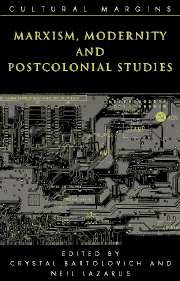Book contents
- Frontmatter
- Contents
- 1 Introduction: Marxism, modernity and postcolonial studies
- Part I Eurocentrism, “the West,” and the world
- Part II Locating modernity
- Part III Marxism, postcolonial studies, and “theory”
- 10 Postcolonial studies between the European wars: an intellectual history
- 11 Marxism, postcolonialism, and The Eighteenth Brumaire
- 12 Postcolonialism and the problematic of uneven development
- 13 Adorno, authenticity, critique
- References
- Index
13 - Adorno, authenticity, critique
Published online by Cambridge University Press: 22 September 2009
- Frontmatter
- Contents
- 1 Introduction: Marxism, modernity and postcolonial studies
- Part I Eurocentrism, “the West,” and the world
- Part II Locating modernity
- Part III Marxism, postcolonial studies, and “theory”
- 10 Postcolonial studies between the European wars: an intellectual history
- 11 Marxism, postcolonialism, and The Eighteenth Brumaire
- 12 Postcolonialism and the problematic of uneven development
- 13 Adorno, authenticity, critique
- References
- Index
Summary
For the mind (Geist) is indeed not capable of producing or grasping the totality of the real, but it may be possible to penetrate the detail, to explode in miniature the mass of merely existing reality.
(Theodor Adorno, “The Actuality of Philosophy”)Among the many quandaries facing postcolonial studies today is the question of how to reckon with the problem of saying something substantial about colonial and imperial history, experience, and effects, while remaining true to the linguistic turn and its decapitation of the body of foundationalist ideas about reality, truth, and indeed history itself. Poststructuralist theory is supposed to have performed the kind of correction on cultural and historical analysis that disallows claims about the real on the grounds that operations of language thoroughly muddy the waters of all determination and experience. Not that linguistic mindfulness has prevented anybody from making elaborate pronouncements about the postcolonial “predicament” – by referring such a predicament to the terms of culture, identity, nationhood, discourse, subjectivity, and so on. But, qualified as readings, they enable the rhetorical flourish we have come to expect from the discourse of postcolonialism at the same time as they keep the vexations of truth at bay. What results from much hand-wringing about postcoloniality – and the ambiguities, aporia, and ambivalences therein – closely resembles the genres of criticism taken to task nearly two decades ago by Edward Said in The World, the Text, and the Critic:
Orphaned by the radical Freudian, Saussurean, and Nietzschean critique of origins, traditions, and knowledge itself, contemporary criticism has achieved its methodological independence by forfeiting an active situation in the world.
- Type
- Chapter
- Information
- Marxism, Modernity and Postcolonial Studies , pp. 240 - 256Publisher: Cambridge University PressPrint publication year: 2002
- 4
- Cited by

